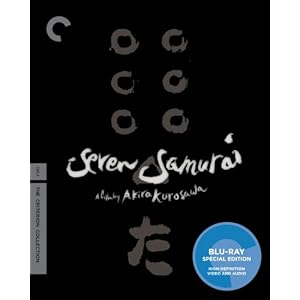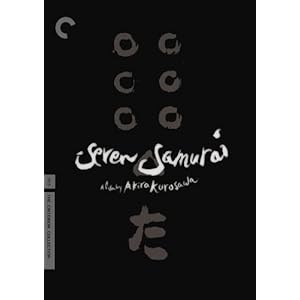

A towering achievement of adventure cinema, Akira Kurosawa's Seven Samurai synthesizes the traditions of the samurai narrative and the American western to create an intimate epic with deeply felt ground-level consequences. No superheroes or transformers here: just men with swords engaging in close combat for reasons practical, profane or, at times, even noble. Treating his characters as fully rounded individuals rather than pawns, and his story as an experience worthy of the rhythms of life, Kurosawa brings his meticulous filmic design to bear on a three-and-a-half-hour film recognized the world over as a masterpiece.
Part of the film's indelible character comes from the collaboration of Kurosawa and leading man Toshiro Mifune, who first paired on 1948's Drunken Angel. The Japanese Brando, Mifune brought idiosyncratic life to a rogue's gallery of alpha males, including Seven Samurai's gruff mercenary Kikuchiyo. Game literally to lay his character bare, Mifune anchors a magnificent ensemble playing the titular ronin: de facto general Kambei Shimada (Takashi Shimura), callow Katsushiro Okamoto (Isao Kimura), crafty strategist Gorobei Katayama (Yoshio Inaba), loyal lieutenant Shichiroji (Daisuke Kato), good-humored Heihachi Hayashida (Minoru Chiaki) and serious-as-a-heart-attack Kyuzo (Seiji Miyaguchi). In sixteenth-century Japan, these masterless samurai band together to defend a village of hardscrabble farmers from the ongoing threat of bandits destroying their livelihood. The samurai ostensibly enter into their agreement with the villagers for money, but more importantly for reasons of personality, whether it be an irrepressible need for the test of combat or an imperative of redemptive honor.
As seasons change (a Kurosawa hallmark), we learn to feel for the samurai and the villagers facing such discouraging odds; the character drama culminates in a thrilling battle that, like any armed conflict, delivers despair to the loser and only cold comfort to the winner, whose victory comes at great cost. As always, Kurosawa excels not only as a dramatist but as a visionary stylist with a distinct command of geography and composition as storytelling tools. In particular, the director was exploring and emulating the form of the American western, especially those of his hero John Ford. Hollywood repaid the compliment with John Sturges' entertaining but conventional remake The Magnificent Seven and, later, endless big and small-screen knock-offs of the potent story (Kurosawa shares screenplay credit with Shinobu Hashimoto and Hideo Oguni). As an action drama and a study of the human spirit under oppressive conditions, Seven Samurai remains a deathless work of cinematic art, perhaps especially for environmentally and fiscally challenging times like this one.

|
|
 |
Criterion's Blu-ray reissue of flagship title Seven Samurai is nothing short of gorgeous. This film has seen a release in every home-video format, and it's never looked so good. The technically impeccable 1080p hi-def transfer uses every available bit of disc space to present the film without interruption (previously, the film had to be spread across two tapes or discs). The results don't fall short of our high expectations: film grain appears naturally, texture and detail are excellent, and contrast is perfect in crisply rendering the black-and-white cinematography. Aside from the very occasional frame jump endemic in the source, the film looks exceptionally clean (thanks in large part to Criterion's digital restoration tools). Audio options are LPCM 1.0 mono and LPCM 2.0 (the packaging incorrectly notes a DTS-HD Master Audio 2.0 track that isn't on the disc); the mono track is preferred in delivering the most authentic and aurally dynamic presentation.
Seven Samurai gets one of Criterion's most thorough packages, with a wealth of bonus features and a sixty-page booklet containing photographs, tech specs, credits, and the following essays by noted writers and filmmakers: "The Hours and Times" by Kenneth Turan, "Seven Rode Together" by Peter Cowie, "A Time of Honor" by Philip Kemp, "Kurosawa's Early Influences" by Peggy Chiao, "The Rains Came" by Alain Silver, "A Magnificent Year" by Stuart Galbraith, "A Tribute from Arthur Penn", "A Tribute from Sidney Lumet, and "Toshiro Mifune: In His Own Words."
The first Blu-ray disc in the set includes a 21st-century commentary with scholars and critics David Desser, Joan Mellen, Stephen Prince, Tony Rayns, and Donald Richie, who discuss the film's making, themes, and influences. Also included is Criterion's 1988 audio commentary with Japanese film expert Michael Jack.
Disc two contains the lion's share of extras, starting with the Seven Samurai installment of Toho Masterworks' definitive documentary series on Kurosawa's films, Akira Kurosawa: It Is Wonderful to Create (49:08, HD). My Life in Cinema is a fascinating, feature-length 1993 conversation between Akira Kurosawa and fellow Japanese director Nagisa Oshima (115:51, HD). The documentary "Seven Samurai: Origins and Influences" (55:06, HD) looks at the Japanese and American inspirations for Kurosawa's film. Also included are three Theatrical Trailers and a Theatrical Teaser, as well as two HD Galleries: "Behind the Scenes" and "Posters."
Here's a title that should earn every critic's highest recommendation, especially in this new Blu-ray edition from Criterion.
 |